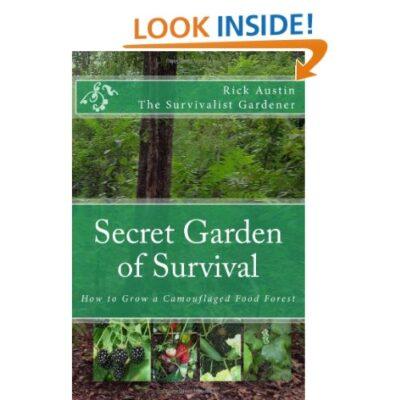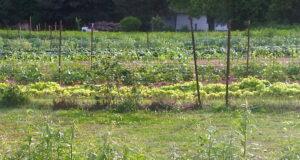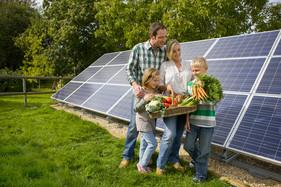|
Listen To The Article
|

Secret Garden Of Survival (pic courtesy of Amazon)
The vulnerability of the power grid is one of the primary motivations for thousands of Americans who have become preppers or opted for a homesteading lifestyle. Secret Garden of Survival-How to Grow a Camouflaged Food-Forest author Rick Austin recently talked about what life would be like after the lights go out with Off The Grid News.
Austin’s homesteading advise is designed to help his fellow man not just survive a natural or man-made disaster, but to thrive in the face of adversity. Mainstream media outlets are leading the evening news with a plethora of North Korea EMP attack stories, but offer no advice on what Americans should be doing to prepare for such a disaster.
The Carrington Event of 1859 should serve as a cautionary tale about the extreme impact a strong Earth-directed solar flare could have on our everyday lives. Both a natural disaster like a solar flare and a man-made tragedy like an EMP attack have the ability to take down our overly-taxed power grid.
OTG – How would an EMP effect life as we know it?
RA – There would be mass panic, society would unravel, and the “have-nots” would take from the “haves” to feed themselves and their families. People would die quickly in the cities, and many of the survivors would “head out toward the country” to find food and resources. We would be blind, without radio, television, or any form of communication; we would be without gas pumps, and without transportation. Just about every vehicle today is run by computer chips. The grocery stores would be out of food within hours-and could never be replenished again. The man-made version of an EMP is one of the things that those “in the know” fear the most, and are not talking much about.
Why would our government really be worried about Iran or North Korea getting one measly little atomic weapon? Well, that is because one weapon launched from a cargo ship over the center of our country would cause an EMP that would take down our entire power grid, and that would, in less than one second, fry every computer, cell phone, ATM, and electronic device in the country.
OTG – What pitfalls would well-prepared Americans face after an EMP attack or downed power grid?
RA – If you are a homesteader, prepper, or just have a traditional garden in your yard, you and your family will be a “target” for the hordes of “locusts” that will be hungry and wandering the countryside, consuming everything in their path.
The great thing about having a Secret Garden of Survival, is that in a situation like the one above, the starving hordes will most likely pass by your house, because your garden doesn’t look like a garden- in fact, it looks like the property was abandoned.
My book, the Secret Garden of Survival-How to Grow a Camouflaged Food-Forest is about having a homestead garden that doesn’t even look like a garden. It looks like overgrown underbrush. It looks “natural” because it is the way that nature grows things. Nature does not grow plants in nice, neat, straight rows, nor does it grow fruit on trellises, etc. Nature grows things wildly, and plants naturally work together in symbiotic relationships that intermingle, intertwine, and ultimately benefit one another.
On the other hand, this Secret Garden of Survival permaculture food-forest, actually grows 5x more food per square foot than traditional gardens, it grows in three dimensions, and you don’t need to use pesticide or fertilizer to make it grow. Where are you going to get pesticide and fertilizer after the grid goes down anyway?
Using my Secret Garden of Survival concept, you plant only once, and then harvest for the next 30 years. You, and your livestock, can live off perennial fruits, nuts, and berries for the balance of your lifetimes. And you don’t need to weed, use fertilizer, use pesticide, and to top that off, no-one will even know you have a garden planted there.
OTG – What is the difference between homesteading and typical farming?
RA – In my view, typical farming today is based on the paradigm of mechanized farming that uses machinery and petrochemicals (fertilizers and pesticides) with mono crops planted in rows, so that machines can more easily harvest these crops in a manner that will maximize yield and bring more produce to market in a short period of time. Unfortunately, this typical farming has stripped the land of its nutrients to the point that the same food in the grocery store today has one-third of the nutrients that those fruits and vegetables had in the 1960s.
That means that you would have to consume three times the food today that you would in the 1960s to get the equivalent amount of nutrients. Maybe our national obesity problem might have something to do with our bodies starving for nutrients that we cannot obtain, no matter how much we stuff ourselves full of food.
Homesteading, on the other hand, is about growing enough food to support yourself and your family. It is much less about making a business out of selling produce, and more about having a “back to the land” lifestyle, and being self-reliant.
Homesteading is about growing your own food, taking care of yourself, and to a larger degree, living on less consumer products, less electricity, and being less dependent on having to earn a paycheck in order to eat and have a roof over your head. I think homesteading is a lifestyle choice. It is the way most families lived before World War I, and many of that old homesteading knowledge was becoming lost as that generation of people passed away.
However, recently we have seen more and more people becoming interested in this simpler, less complex lifestyle and I am seeing a resurgence in people wanting to learn these old homesteading techniques.
OTG – Is there a link between the homesteading and prepper lifestyle?
RA – I see that some preppers are homesteaders, and some homesteaders are preppers. But there are a lot of preppers out there that may have a bug-out location, however, they are not now living that kind of lifestyle. I think that is dangerous for them. You have no idea what you will be up against, until you live that lifestyle every single day. The time to learn how to grow your own food, take care of livestock, and preserve your own food, is before there is a crisis situation.
Furthermore, I see a lot of preppers that still have a consumer oriented mind-set and think that they can buy their way out of a disaster situation. They may have all the toys, gadgets, weapons, and prepackaged storage foods, but they have no plan for the day – in a long term scenario like an EMP -when they have to fend for themselves once their food and water stores have run out.
And because they simply bought their food stores as another packaged consumer product, they do not have the skills it takes to grow what they will need to replenish it. In my experience, most people today cannot even recognize food unless it is packaged and labeled. They could not tell you what a food growing plant was in the field, and most would starve to death, with food right under their nose.
OTG – Has there been an increase in people living a homesteading lifestyle in recent years, or is the topic just gathering a lot more news attention now?
RA – I see there is a real resurgence in homesteading, in self-sufficiency, and in wanting to be self-reliant. I find people are becoming more educated about the “homesteading arts,” in part, because they have seen that they cannot rely on governments to save them in times of crisis.
However, I also see that it is more than just disaster preparedness. I think people are wanting a simpler, less stressful life, and there is a great deal of personal satisfaction from being able to pick your own food, collect your own eggs, and consuming milk, butter, and cheese from your own livestock. And it is a far healthier lifestyle, with better quality food, and less chemicals.
OTG – How difficult is it for a novice to begin a homesteading lifestyle? How do you get started in the self-reliant lifestyle?
RA – For the most part I think people just lack information. They can do it, and there are more sources of information available today than ever before. You can do searches on the web, and find websites and videos on how to do just about everything in homesteading.
My advice is to take advantage of gathering that knowledge now- before an EMP. Because after that, you can forget about searching the web for anything. Ultimately, you have got to make the leap. You can’t just have one foot in the city and one in the country. At some point, if you are really going to be self-reliant, you have to just make the switch and learn by doing it.
OTG – Does solar power play a significant role in the homesteading existence?
RA – I believe that if you have an efficient home design in the first place, passive solar heat, solar hot water and active solar electricity (photo-voltaics) can play a role in homesteading.
The biggest mistake people make is trying to live off grid and use solar power to heat, and run electric devices that are totally inefficient to start with. You need to think about having a minimal footprint, so that you are not trying to heat or power a 6,000 sq. ft. house with solar. That is where you get into costly solar systems that will never pay back their investment. The best way to use solar is to have an efficient house to start with, so that you won’t need to use a lot of power to heat or cool the property.
A simple thing like painting the walls bright colors, reduces the need for stronger light bulbs, and reduces your electricity.
Most power in a typical household today is consumed by heating, cooling, and heating water. If you can focus on making those things more economical, you will greatly reduce your need for power in the first place. The best places to start, therefore, are on having good home insulation. There are a lot of spray-in foam insulation products today that are super-efficient and non-toxic, that didn’t even exist 10 years ago. In addition, efficient windows, and an efficient hot water heater will go the furthest toward reducing your need for power consumption in the first place.
We use solar panels to store power for batteries for our lights at night, lights in the garden, solar motion sensor lights for the house, and to power fans during the day. This way the sun runs fans that cool our house (and barn) during the day and lights up our house at night.
OTG – What are the average advantages and disadvantages of living life on a homestead?
RA -As I stated before, it is a simpler, less stressful lifestyle and is gratifying in that you are taking care of your crops and your animals that will ultimately take care of you.
Yes, it is a lot of work and requires long hours. But there is no boss breathing down your neck, no threat of losing your “job,” and the commute to work is short and without stress. Compared to the white knuckle-take your life in your hands- driving to and from work every day in the city that I used to do before we took the leap to living in the country on our homestead, this is like living in heaven.
Being less stressful, and living on better food, with more exercise, certainly makes it a healthier lifestyle as well.
OTG – What advice would you give to someone interested in homesteading?
RA – Do all the research you can, talk to people who are doing it. Make a plan, and give yourself a deadline to make the leap into the homestead. If you own property, start working on it now. If you are looking for property, there are a lot of farms and farm land in the country that is very reasonably priced these days.
The way I see it, people who are living anything but a homesteading life are on a sinking ship. The Titanic is filling up with water- even if the passengers don’t know it yet. It’s just a matter of time before they go under, and there are not enough life rafts to save everyone once it sinks.
OTG – How do homesteading families deal with medical and schooling issues?
RA – Most non-catastrophic needs for medicine can be dealt with at home, in the same manner people used to do so for ages. Most of the over-the-counter drugs today ultimately come from plants, herbs and other “medicines” that people had available to them before the days of multi-billion dollar pharmaceutical companies patenting ingredients found for free in nature.
There are also some great books on the market, such as The Doom and Bloom Survival Medicine Handbook. It discusses how to deal with everything, from minor medical issues to acute traumas, in a disaster situation. And should an EMP actually happen and take down our power grid, there will be no more hospitals, doctors, or nurses available to take care of you and your family after the first two weeks- if that.
As far as schooling goes, without an EMP, there are plenty of distance learning alternatives today that didn’t exist back in the day. So learning, schooling, and the like can be done from anywhere, as long as you have an internet connection.
We have a lot of books too. We have books about everything from history, to disaster preparedness, to the classics. In a world without power, these books will become our “television” and our entertainment. And in many cases, these books will answer our questions on everything from basic physics to medicine.
OTG – Are there any online homesteading groups that connect for social or training purposes?
RA – There are homesteading websites, magazines, and conferences all over the country that people can tap into. In fact, I am speaking at a three day homesteading conference on May 17-19 in Waynesville, NC called the Heritage Life Skills II Weekend, and this event will be teaching people many of the lost homesteading arts, from canning foods, to tanning hides, to blacksmithing.
 Off The Grid News Better Ideas For Off The Grid Living
Off The Grid News Better Ideas For Off The Grid Living






